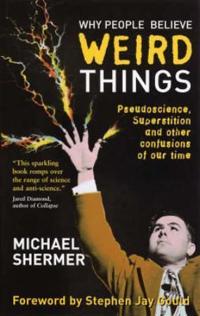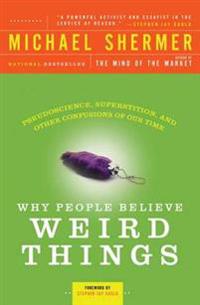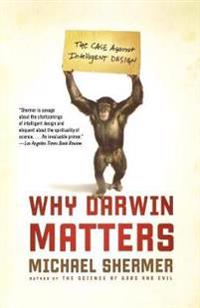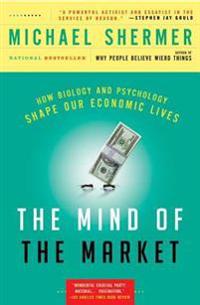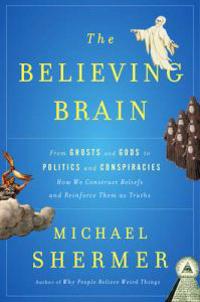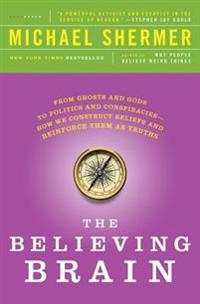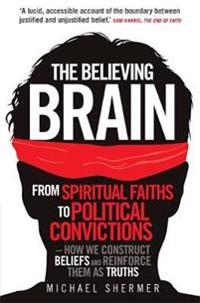Think Like a Maths Genius (Häftad)
avArthur Benjaman, Michael Shermer
ISBN: 9780285637764 - UTGIVEN: 200610The Art of Calculating in Your Head. From two renowned mathematical geniuses comes an accessible guide to mentally calculating Maths at lightning speed and with amazing ease.[...]
Secrets of Mental Math (Pocket)
avArthur Benjamin, Michael Shermer, Arthur Benjamin
ISBN: 9780307338402 - UTGIVEN: 200608An accessible guide to mathematical calculation reveals the secrets of rapid mental calculation, memorization, and other feats of the mind, with tips on how to add, subtract, multiply, divide, and work with fractions, squares, and cube roots. Original. 15,000 first printing.[...]
Denying History (Häftad)
avMichael Shermer, Alex Grobman
ISBN: 9780520260986 - UTGIVEN: 200904"Denying History" takes a bold and in-depth look at those who say the Holocaust never happened and explores the motivations behind such claims. While most commentators have dismissed the Holocaust deniers as antisemitic neo-Nazi thugs who do not deserve a response, historians Michael Shermer and Ale[...]
Why People Believe Weird Things: Pseudoscience, Superstition, and Other Confusions of Our Time (Häftad)
avMichael Shermer, Stephen Jay Gould
ISBN: 9780805070897 - UTGIVEN: 200209In Why People Believe Weird Things, science historian Michael Shermer explores the very human reasons we find otherworldly phenomena, conspiracy theories, and cults so appealing. The editor of Skeptic magazine and the director of the Skeptics Society, Shermer shows how the eternal search for meaning[...]
How We Believe, 2nd Edition: Science, Skepticism, and the Search for God (Häftad)
avMichael Shermer
ISBN: 9780805074796 - UTGIVEN: 200310The Science of Good and Evil: Why People Cheat, Gossip, Care, Share, and Follow the Golden Rule (Häftad)
avMichael Shermer
ISBN: 9780805077698 - UTGIVEN: 200504The renowned science historian reveals how humans have evolved from social primates into moral primates, exploring the implications of fuzzy logic, fate, free will, and ecology, among other issues affecting the way humans think about moral issues. Reprint. 30,000 first printing.[...]
Why Darwin Matters: The Case Against Intelligent Design (Häftad)
avMichael Shermer
ISBN: 9780805083064 - UTGIVEN: 200707The Mind of the Market: How Biology and Psychology Shape Our Economic Lives (Häftad)
avMichael Shermer
ISBN: 9780805089165 - UTGIVEN: 200901The Believing Brain (Inbunden)
avMichael Shermer
ISBN: 9780805091250 - UTGIVEN: 201105In this work synthesizing thirty years of research, psychologist, historian of science, and the world's best-known skeptic Michael Shermer upends the traditional thinking about how humans form beliefs about the world. Simply put, beliefs come first and explanations for beliefs follow. The brain, She[...]
The Moral ARC (Inbunden)
avMichael Shermer
ISBN: 9780805096910 - UTGIVEN: 2015-02From Galileo and Newton to Thomas Hobbes and Martin Luther King, Jr., thinkers throughout history have consciously employed scientific techniques to better understand the non-physical world. The Age of Reason and the Enlightenment led theorists to apply scientific reasoning to the non-scientific dis[...]
The Believing Brain: From Ghosts and Gods to Politics and Conspiracies - How We Construct Beliefs and Reinforce Them as Truths (Häftad)
avMichael Shermer
ISBN: 9781250008800 - UTGIVEN: 201208Synthesizing thirty years of research, psychologist and science historian Michael Shermer upends the traditional thinking about how humans form beliefs about the world. Simply put, beliefs come first and explanations for beliefs follow. The brain, Shermer argues, is a belief engine. Using sensory da[...]
The Believing Brain (Häftad)
avMichael Shermer
ISBN: 9781780335292 - UTGIVEN: 201206Synthesizing thirty years of research, psychologist and science historian, Michael Shermer upends the traditional thinking about how humans form beliefs about the world. Simply put, beliefs come first and explanations for beliefs follow. The brain, Shermer argues, is a belief engine. Using sensory d[...]
The Skeptic Encyclopedia of Pseudoscience (Inbunden)
avMichael (EDT) Shermer, Pat (EDT) Linse, Michael (EDT) Shermer
ISBN: 9781576076538 - UTGIVEN: 2002-11


